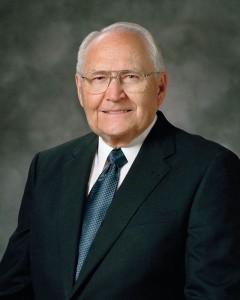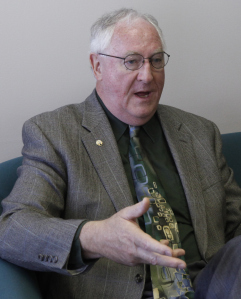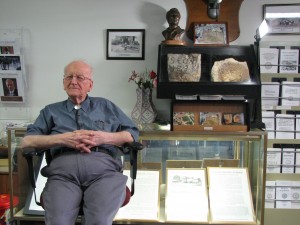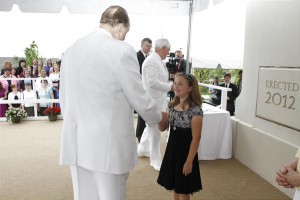While living in Reno in 2010 we got an exciting announcement in our ward: L. Tom Perry was coming to speak to us in our next Stake Conference. We were all excited to hear from an Apostle. We were told that it had been many years since an apostle had visited and that this was a special opportunity to hear from a special witness of Jesus Christ. My wife and I showed up extra early for the Saturday adult session to make sure that we got the cushy seats up front and not the hard folding chairs in the cultural hall. We sat next to some friends and I joked that Elder Perry was going to tell us that we are the chosen stake and that we must start the trip to Jackson County. We sat, waiting in anticipation for Elder Perry’s arrival. Everyone began standing up. So I stood up. I looked around and saw Elder Perry walking in from the side entrance. I felt vaguely uncomfortable that we were standing. He is an important leader of our Church, sure. But I also thought that apostles are men just like me. It felt too reverential. During his talk, Elder Perry talked about his brand new iPad (they had just come out). He gave it a glowing review and said he could now give talks without having written notes. Everyone laughed at his display of humanity. We felt close to him in a way that we never got from hearing him speak in General Conference. All it took was the slightest hint of telling us of his personal life. A little anecdote about his daily life left the audience rolling with laughter.
In 2012 I had some interest in the new Latter-Day Seekers program that the Community of Christ was starting to push. I got on the Latter-Day Seekers website and sent an e-mail on the contact page asking if a local Community of Christ congregation would know about the program if I were to show up for services on a Sunday morning. I got an e-mail back from Dale Luffman of the Council of Twelve Apostles. I was surprised to receive an e-mail from an apostle. I thought it would go to a random secretary somewhere. He told me a little bit about the program and asked from my phone number so that he could have someone from a nearby congregation contact me. I told all of my Mormon friends that I got an e-mail from an apostle. They were amazed that I got an e-mail from an apostle and immediately asked what it said. When I told them he said to contact local Community of Christ leaders they were a bit disappointed. They’re never impressed that I got an e-mail from a “false apostle.”
A year later I found a really cheap source of Book of Commandments reprints that are sold by the Church of Christ-Temple Lot. However, it didn’t say what the cost of shipping was. I e-mailed the “Contact Us” e-mail on the form and got a response the next day. It said that shipping was $2. The e-mail was from William Sheldon, Apostle.
Differences of Size
One big difference between the three apostles in these experiences is the size of the church that they lead. L. Tom Perry is an apostle of a church with a reported membership of 15,000,000. The Community of Christ reports 250,000, and Church of Christ-Temple Lot has just over 7000. As a church gets larger there is a natural increase of distance from the top to the bottom. Elder Perry is generally only seen in official speaking capacities. With Dale Luffman he responded to me when inquiring about a program he is in charge of. William Sheldon is apparently in charge of shipping.
The Problem
However, the Mormon Church has more issues with church leaders than simply the size. We are completely and utterly cut off from our church leaders. Sending a letter to the First Presidency results in it being sent to local leadership instead. Many Church members view the First Presidency and Quorum of Twelve as being functionally infallible. While it used to be that when someone voted “no” in General Conference they spoke to an apostle, when this happened in the past Conference they were told to speak to their Stake Presidents. In podcasts about voting no, Micah Nickolaisen compared this to a call to customer service: You call about a problem with your bill, the customer service representative says he does not have the power to fix the problem and transfers you to a manager. When speaking to the manager she says that she doesn’t deal with these types of problems and sends you back to the customer service representative. Access to Church leaders is gone. While if you live in Northern Utah you might have a friend whose uncle is close friends with the brother of an apostle, those of us outside of Utah aren’t even that close.
Fixing Correspondence
Is there any way to fix this problem? Giving any church member the ability to e-mail an apostle may be too much to ask. They may truly be too busy to reply to all of the e-mails and letters, even through secretaries. However, they could possibly develop canned responses to certain e-mails:
- A question of policy – A reply containing the current position of the church. These could possibly be forwarded to the Church PR department if they like.
- Asking for a change in doctrine/policy – Canned response stating that they consider and pray about all possibilities. Perhaps stating that they keep track of issues when they receive more letters about them would be appropriate.
- Asking for prayers for a loved one – Canned response stating that all names will be added to the temple prayer roll. Maybe this would be an actual case where a letter could be forwarded to local leadership to make sure that all needs are taken care of.
Fixing Leadership Worship
Fixing the problem of leadership worship is a little bit bigger challenge. Because we are so separated from the Apostles and First Presidency, it increases their godlike status and functional infallibility. I have a couple ideas for fixing this problem:
- Retract Statements and doctrines
The current system usually follows this pattern: 1) Church Doctrines that are no longer accepted are slowly faded out through no longer talking about them in General Conference or Church magazines. 2) This old Doctrine is assigned to “Church culture” and claimed to have never been Doctrine. 3) When given quotes from apostles or prophets about this Doctrine these are claimed to have never been Official Doctrine but were simply given as opinions. Instead we should have church leaders teach us about when we had wrong ideas in the past. Talk about how infallibility is real. “Line upon line” doesn’t mean we only add new doctrines but that we replace old ones. Revelation is a human process and we slowly evolve to come closer to divinity.
- Give us a peak behind the curtain
This is related to point number one: let us know what goes on in those meetings with the First Presidency and the Quorum of the Twelve. Let us know when you are considering different issues. Let us know when there are arguments. Tell us about how the discussions and disagreements led to revelation. Don’t pretend that one day God didn’t want black people to have the Priesthood and the next day Spencer W. Kimball received a revelation saying they should receive the Priesthood. Show us the humanity in the process.
- Change the voting system
The current sustaining process is not a vote. This was not always the case in Mormonism. Church leaders may have to admit that the current system is not working to change it. Tell the church members that when the majority vote no that a policy will not be enacted, or a calling will not be filled. Promote disagreement and honesty.
- Stop Asking for Obedience and Reverence
Tell church members to stop standing when leaders enter a room. Ask those giving talks in General Conference not to give talks about obeying leaders. Seemingly every manual has a lesson (or more) about the importance of obeying leaders in any situation. Get rid of them. Add more lessons about disagreements between church leaders (Acts 15) and the evolution and change of doctrine. Add lessons about what to do when the Spirit does not confirm the decision or teaching of a church leader. And no, the answer is not to pray harder until the Spirit does tell you that their decision or teaching was correct.
Conclusion
I have hope that things will change but if they do it will be slow. We are a church that moves at a glacial pace. However, when we as church members change ourselves first change happens more quickly. One of the biggest changes in my view of the Church was in my late teens when I realized that the Prophet of the Church doesn’t have nightly visits from Jesus and receive perfect revelation from God. While I was only a dumb teen this seems to be similar to the view of many lifelong adult members of the Church. Of course the Prophet doesn’t receive perfect revelation. It’s not even nearly perfect. It is completely and utterly human with the hope of a spark of divinity. Some day we will all believe it. Hopefully.











Great thoughts on this important subject. But I’m a bit puzzled why you’d even have hope this will change. If anything, GA worship will only get stronger. Look at the last General Conference vote, the aftermath had more of a feeling to lynch the dissenters than welcome any opposition.
They will get more distant, isolated, older and handled in the future. I have little hope for positive change, as you see it. The church is as conservative as any organization and resists to the utmost any and all change. There is no place for, or even a path to get, reformers at the top. Future leaders are handpicked by the current regime. But here’s to wishful thinking!
I always finish my posts with hope. I’m a positive guy. My hopes are not predictions.
Great ideas to solve a very real and troubling problem. May I suggest one more? How about being more candid about the health problems that President Monson is suffering from? The church seems unwilling to acknowledge that he is suffering from dementia, but rumors about it have been circulating for years. Readily admitting to these challenges (which the product of old age and nothing to be ashamed of) would help members see that the church leaders are normal people with normal challenges.
And don’t get me started on the need for an emeritus status for the 12.
The “prophet cult” (or, widening a bit, “GA Worship”) is a natural phenomenon that happens in many context (military high-brass, high-ranking political leaders, the Pope, the Dhali Lama, etc.). Meanwhile, cultural trends, e.g., access, transparency, etc., give us lenses through which we judge situations, and often our judgments boil down to: They’re doing it wrong. In my experience, I have had opportunity to interact, sometimes one-on-one, with General Authorities at mission conferences, stake conferences, in a bishopric and sometimes by happenstance (we saw President Monson once in an elevator while visiting Salt Lake City; no body guards or anything), etc. I don’t expect – nor do I believe it realistic to expect – that any encounter with a General Authority will or should have an influence on the Church. Rather, ideas get passed up through the ranks – and for a 15,000,000+ organization, LDSaints have one of the flattest organizational structures on earth – bishop->stake president->area authorities/area presidencies (GA’s)->Church leadership (presiding GA’s). Stake presidents (and mission presidents) have access to GA’s (I recently had a problem that required GA involvement; I sent a few emails on Thursday and results were granted by Saturday morning; I went through “proper channels”). Probably we have access to 70’s more than we think (I once called Church HQ over a situation concerning a Mormonad in the New Era which resulted in my 11-yr-old son viewing pornography for the first time ever; during the call I was transferred to a 70 to whom I repeated my concerns; I never heard back from him BUT that particular Mormonad was NEVER reproduced outside its initial printing in the New Era). One of my sons recently wrote to Elder Holland (of the 12) to tell of an experience he had in the Sunday School class he was teaching that involved a student being touched by Elder Holland’s teachings; Elder Holland wrote my son a personal letter in response.
I think we see what we are looking for. General Authorities are human, fallible, getting very old (many) and don’t have time to deal with every concern of every LDSaint; that’s what local leaders are for.
As for worshipping – I doubt if standing up for a GA (especially an apostle or member of the first presidency) truly rises to the level of worship; being polite is being polite, and in our culture Americans stand when the president of the US enters the room, Mormons stand when the Prophet (or other apostle) enters the room (if there is an “entrance” – I once found Elder Hales sitting in our congregation minding his own business; he was there to stand in on a blessing for one of his grand-relatives; I (a member of the bishopric at the time) invited him to sit on the stand; he even agreed to speak to us at the end of our meeting; it was marvelous), etc. The problem is if that honoring turns into some kind of worship that certainly is NOT taught in the Church, I believe it is more a cultural, rather than organizational, problem.
When my family joined the church my Mom had a huge issue with it shortly after baptism.she mentioned she wanted to send a letter to the prophet about it. She was told that he would never see it and to resolve issues locally, which meant to deal with the same leaders she was having problems with. That was the end for her. On my mission, Elder Abrea from 70 visited. Another missionary and I were the only ones from Argentina, where Abrea is from. He didn’t even smiled when he shook my hand. He came across as arrogant. My friend and her family met Elder Cook at a fireside. Whenever she mentions it, more than once so far, she talks about it as she is closer, I don’t know, the prophet? By the mere act of meeting Elder Cook. I don’t get it. But I can see how distant we are from them and unless we have some connection of family relation, professional, or deep pockets , I don’t see how we can even relate.
Outstanding post, L Thomas. I love the contrast of your three stories of contact with apostles. I suspect if you go to a point where the LDS church’s size matches the CoC by moving backward in time, you see a similar outcome: people have closer contact with Church leaders.
I think you rightly point to the problem of GAs being seen as effectively infallible as associated with the problem of lack of contact. I think these are self-reinforcing. When the First Presidency sends a letter to wards and branches every year or so that says “please don’t write us” and warns that any communication will be sent back to local leaders, the implication is that there is *no* problem that could arise at a local level that GAs won’t have already come up with a solution for. Which of course suggests that they’re infallible. Which of course is bunk.
I really like your proposed solutions too, but I agree with Shadrak that I don’t see it as likely that they will come about. I don’t think the culture (doctrine?) of total obedience and absolute deference to authority arose as part of a conscious plan, but more likely came about naturally as the Church grew and correlation regularized and systematized everything. But now that it’s here, I think GAs have found it useful, and I doubt they’re going to give it up.
Thanks, Ziff! I agree that a lot of the differences between the three apostles comes from the size of the three different churches.
I also think that the culture of obedience and deference to authority arose organically, but that correlation is an unstoppable monster once it gets going. I have a feeling it is the most obedient and deferential that end up on the manual committees. So they themselves view these as important qualities and so they put them in the manuals. Those manuals create more people that think that obedience and deference are important qualities. Then there is a greater percentage of those people when it comes time to find people to put on the manual committee. Sometimes thinking about these things is discouraging.
Fantastic article; thanks for sharing your thoughts.
Making the finances transparent would go a long way to fixing a lot of these issues. It’s just like campaign finance reform in government. Fix things at the source and you solve a lot of problems.
Craig,
I agree. I would like to see where my tithing funds are appropriated.
There is a Lot more to be said besides. How about worship of the church instead of God the Father and his son Jesus Christ.